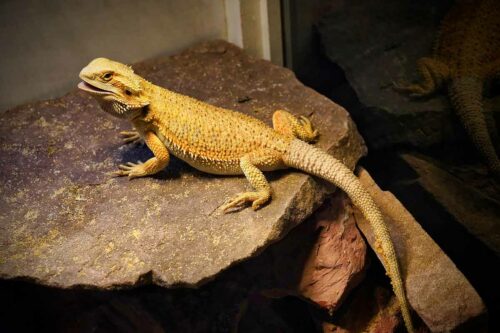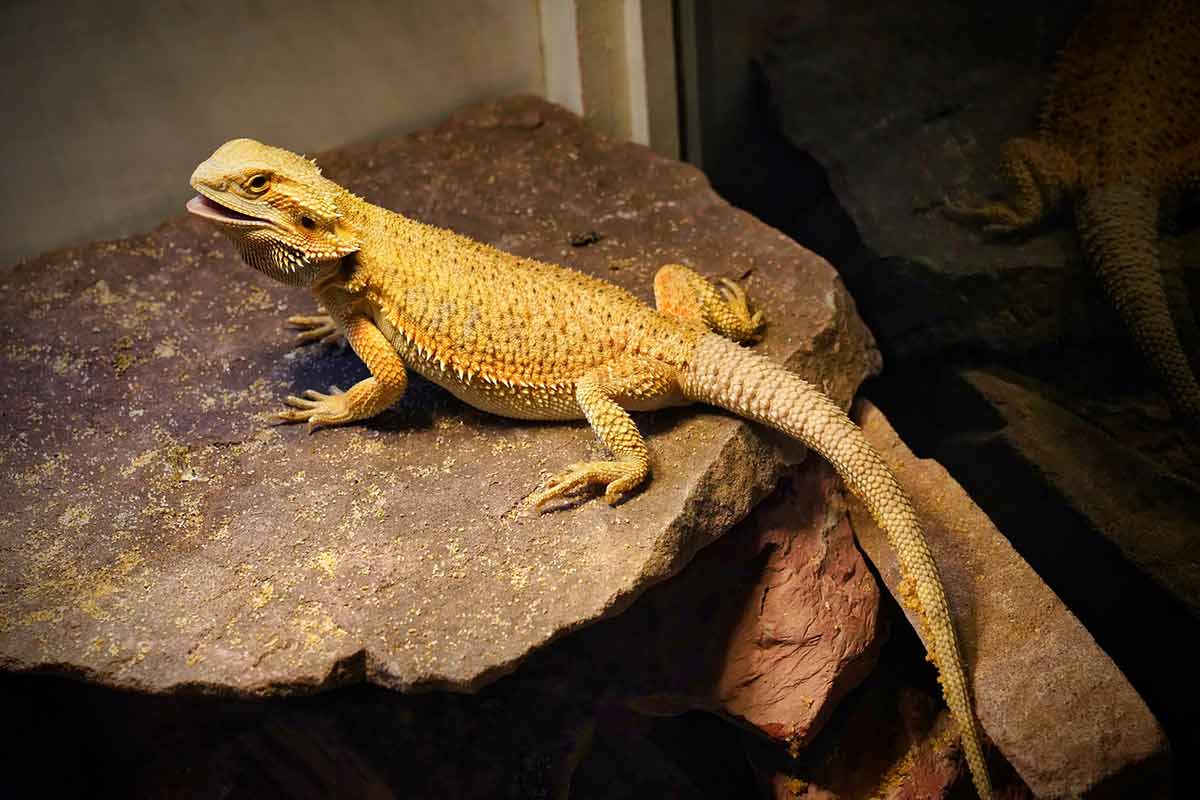Many new bearded dragon pet parents are curious whether their beardies are nocturnal and will spend the evening scuttling about their habitat.
But bearded dragons are actually diurnal animals, which means they are active during the day and sleep at night. This is good news, as it means they should be active at the same time you are.
But are you wondering why bearded dragons are creatures of the day, how much time it’s healthy for them to spend sleeping, and how you can ensure that your beardie always gets a good night’s sleep?

Read on as we take a closer look at the sleeping patterns of bearded dragons and how to manage their habitat for optimum rest and recuperation.
Bearded Dragons: Daytime Activity
Bearded dragons are diurnal reptiles, which means they’re active during the day and sleep at night. This is common for cold-blooded animals because they rely on external heat to regulate their body temperature.
This means they feel most energetic during the warmer daylight hours and have less energy at night, making this a better time to sleep.
You beardie should wake up with the sun. Upon waking, the first thing they’ll want to do is find a warm place to bask in the sun. Consider it their morning sun salutation. This morning warming allows them to recharge their batteries and get started with the day.
When they bask first thing in the morning, you may notice that their skin turns a darker shade. This allows them to absorb heat more quickly. As they get up to a good body temperature, their skin will take on a lighter color.
Once they’re ready, the next thing your beardie will probably want to do is eat. In the wild, this is when they will start hunting. In captivity, this is the ideal moment for their first feed.
Ideally, they should have their first, and sometimes only, meal of the day about two hours after waking.
Read our guide to when and how often to feed your bearded dragon.
Once they’re awake, your bearded dragon will probably spend between 12 to 16 hours up and about. Exactly how long depends on the time of year.
They adjust their activity for light and temperature, so they’ll be more active in the hotter summer months with longer days and less active on colder, shorter winter days.
You can also expect that your bearded dragon will have a few other basking sessions throughout the day. While they may look at rest, this is not part of their sleep cycle.
They are recharging their batteries, but they’re alert while basking. If a predator approaches, they will be aware of it.
Bearded Dragon: Nighttime Activity
When the lights start to dim, your bearded dragon will be ready to curl up for a snooze. But beardies actually sleep in some pretty strange positions.
While they might find a sheltered cave or bury themselves in sand to hide from predators, bearded dragons are also known to sleep upright, sometimes leaning against a tree or a wall.
In summer, your beardie will probably sleep between eight and 12 hours a night if they have a healthy circadian rhythm.
In these months, they experience rapid eye movement (REM) sleep, which is the kind of sleep that we as humans are familiar with. Their bodies can twitch as they sleep, and this is more common in younger bearded dragons.
In winter, your bearded dragon will sleep for at least 12 hours a night, and probably more. They will also seem more sluggish during the day and eat less.
This period is known as brumation and is a semi-hibernation state. During this time, they will experience slow wave sleep, with slow breathing that will make them appear almost dead. This is done to conserve energy.
Brumation can last anywhere from a few days to a few months. While this should happen every year, the length of the brumation will depend on their environment.
In colder climates, you can expect brumation to last for three to four months, while in consistently hot temperatures it will be much shorter.
Read more about bearded dragon brumation here.
Optimizing Your Beardie’s Habitat For Sleep
Because your bearded dragon’s sleep cycles are dictated by the cycles of the day and the year, if you want to ensure they’re getting appropriate sleep, you need to establish their environment to mimic their natural habitat.
This starts with UVA and UVB lamps capable of generating the light and heat that beardies need during the day.
Ideally, you will want to keep the temperature in the habitat between 104 and 107 degrees Fahrenheit during the day, with clear areas for basking and separate shaded areas for them to enter and leave the heat as needed.
Check out Amazon’s range of reptile UVA and UVB lights here.
Lights should be turned on around sunrise and turned off around sunset to mimic day and night. Ideally, you should put the lights on a timer for consistency.
If possible, you will also want to extend daylight hours slightly in the summer and shorten them a little in the winter.
For example, you can extend from 12 to 14 hours of sunlight for summer by extending the day by 10 minutes on either side daily until you reach your new time.
Don’t forget to turn heat lamps off overnight as well as lights. If you leave them on, your beardie will overheat in their tank. The temperature inside the tank should be around 60 degrees Fahrenheit at night.
It is also important to remember to place your bearded dragon’s terrarium somewhere in the house where it will not be affected by light pollution from other rooms when you are up and about at night. This leaking light will disrupt their sleep.
Similarly, bearded dragons prefer relative quiet to sleep. Music, sound from the television, or other loud noises can disturb their sleep cycles and be detrimental to their health.
Bearded Dragon Sleep FAQs
Are bearded dragons active at night?
Bearded dragons are diurnal, which means they’re active during the day and sleep at night. You should expect a healthy bearded dragon to be fairly inactive at night as they will get between eight and 14 hours of sleep depending on the time of year.
Does a bearded dragon need light at night?
Your bearded dragon does not need light at night, and lights should be switched off to mimic nighttime hours and allow your beardie to sleep properly. Light pollution from other rooms and electronics can interfere with your beardie’s natural sleep cycles and undermine their health.
Do I turn off my UVB light at night?
UVB lights should be switched off at night to allow your bearded dragon to sleep. As cold-blooded animals, beardies use light and sun to regulate their body temperature.
They need sunlight and warmth during the day to charge their body for activity, and cool and darkness at night to shut down and recharge. Leaving a UVB light on at night will prevent them from getting enough sleep and can lead to overheating.
Can I wake my bearded dragon?
It’s never a good idea to wake your bearded dragon when they’re sleeping. If they are getting some shut eye, it’s because they need it.
If they are sleeping longer than usual, consider whether they might be in the natural brumation cycle and if this is normal. There is not really any good reason to wake up your beardie while they’re sleeping.
Read bearded dragon FAQs: how to keep your pet lizard healthy.
A Good Night’s Sleep
We know how important sleep is for the human brain and body — it’s when we do our healing and incorporate all the new stimuli that we have acquired during the day into our person.
It’s when our muscles grow and our minds expand. The same rules hold true for your bearded dragon. They will be a healthier and happier reptile if they’re getting the sleep they need.
The best thing you can do to ensure your bearded dragon is getting the right kind of sleep at the right time and the right amount is to optimize their habitat.
It should mimic the daylight hour and heat of the day, and give them calm and cool at night. Also, keep them away from the natural distractions of the home at night such as the television and loud conversation.
This small amount of effort can make a huge difference to your beardie’s quality of life. Read our complete bearded dragon care sheet with everything you need to know about looking after your beardie.
- Can Guinea Pigs Eat Potatoes? Foods To Avoid - September 24, 2023
- Can Guinea Pigs Eat Carrots? Feeding Advice - September 23, 2023
- How To Make A DIY Bearded Dragon Enclosure - September 22, 2023

